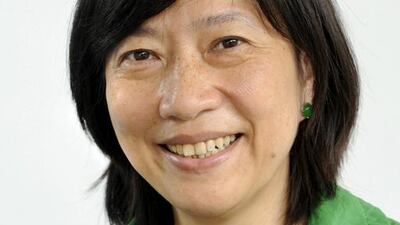The eyes of the literary world are on the judging panel for the Man Booker Prize today, ahead of a final decision on which 2013 novel will pick up one of the most prestigious awards for fiction. But it won’t be the only important gathering of literary experts. The judges for its sister award, the Man Booker International Prize, meet for the first time to discuss which authors might make the 2015 shortlist. And the presence of Wen-chin Ouyang as a judge could genuinely be a significant moment in the development of Arab fiction.
If that sounds over the top, consider this. Ouyang is professor of Arabic and comparative literature at SOAS, University of London. She has a wide body of published work investigating the Arabic novel and is the editor-in-chief of the Middle Eastern Literatures journal. If anyone can wave the flag for Arab writers in the Man Booker International Prize, it’s her.
“It’s thrilling to be a judge,” she says of the biennial award, which focuses on the career of an author rather than simply their last book. “And yes, I admit, it is a great opportunity for Arab fiction writers I know who are really very good and worthy of more attention. There are plenty who have yet to be discovered outside the Arab world.”
The reason that the inclusion of Ouyang as a judge is so exciting is that, unlike the Man Booker Prize, there is no submission process. The panel propose their own names. And given that it’s chaired by Marina Warner, who won a Sheikh Zayed Prize for Stranger Magic: Charmed States and the Arabian Nights, and teaches at NYU Abu Dhabi, there’s plenty to suggest that their gaze may well fall on the Middle East.
And not before time. Of the 70 authors shortlisted in the history of the Man Booker International Prize, there’s only been one writer from the Arab world: the late Egyptian writer Naguib Mahfouz. He didn’t win, but then, being awarded the Nobel Prize for Literature in 1988 was probably sufficient.
“We know about Naguib Mahfouz, of course, but there are other equally important authors now,” says Ouyang. “The way the Arab novel has progressed has been quite fascinating, and for me, it’s become the most important genre in modern Arabic writing. Most critics agree that it reached maturity with Mahfouz, but I genuinely think there are now novelists who have taken the Arabic novel quite a few steps further in terms of experimentation and tackling contemporary issues.”
One might think cajoling some of the names of these novelists out of Ouyang in advance of the panel’s first meeting would be tricky, but she’s so endearingly enthusiastic about the quality of writing coming out of the Arab world that she can’t help herself.
“Ibrahim Nasrallah I like very much, but he’s little-known outside Palestine. There’s a Lebanese writer, Rabee Jaber, who is also not particularly talked about outside the Arabic-speaking world. And I always look forward to the work of another Lebanese writer, Hoda Barakat.
“Then of course, there are Arab writers who don’t write in Arabic, which is an important distinction. My favourite of those right now is Rawi Hage– his work is really gripping. But no, I’m not going to give away too many names.”
Ouyang may be throwing us off the scent. The Canada-based Hage, as good as he is, has only published three novels – hardly a body of work. To say that Nasrallah, Barakat and Jaber are relative unknowns is a slight misnomer – they were all longlisted for this year’s International Prize for Arabic Fiction, and Jaber won it in 2012. But none of them have had many books translated, which may be their undoing for Man Booker International consideration – the award can be bestowed upon an author writing in any language, just as long as their novels are widely available in English.
Still, Ouyang’s day-to-day contact with Arabic writing tells her that there’s a real spread of novelists to choose from in the months to come. Which is not bad for a form that, until relatively recently, was nowhere near as potent a means of literary expression as poetry.
“Lots has changed,” she agrees. “And that’s because of historical and political circumstances, and maybe the need for more space to work out the complexities of modern life.
“Best of all, there’s not one style of Arab novel, nor are we seeing pastiches of European fiction. There’s a real sense of a diverse, multicultural writing scene, and I hope we can show that in this prize. I’m really excited.”
• Visit www.themanbookerprize.com for more information

